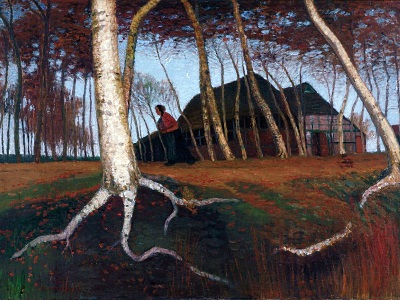The first volume of Inner Land carries the title The Inner Life. This is also the name of its first major chapter, the focus of this article.
Underscoring a central theme of all five volumes, Arnold opens by urging his readers to look to the life within. A human being cannot be sustained by the outer life alone: “With increasing unrestraint, the will to live our own life as a nation or as an individual lays claim on our whole being for the upkeep and improvement of our material existence; it is not able to provide a deep inner foundation” (11).
Arnold discovers a precedent for such a focus in the German mystic Meister Eckhart. This medieval theologian commended a life of “detachment,” in which outer circumstances are not ultimately decisive for the inner person. Whatever transpires, whether suffering or death, war or prosperity, the inner life abides. For Arnold, Eckhart provides an important starting point, and his insights remain valuable for Christians today. Nonetheless, the mystic is in danger of making detachment the goal of discipleship, rather than a means by which the individual may be transformed and live an outwardly fruitful life in accordance with the teachings of Jesus.
According to Arnold, there is no room for “pious selfishness” (13), that is, any enrichment of the inner life that does not flow into and determine how we conduct ourselves outwardly. This has always been a danger to Christians throughout history, and Eckhart’s theology is open to misunderstanding. Against this, “we must never withdraw from the rushing stream of present-day life into a selfishness of soul that makes our love grow cold in the face of need. … Our detachment, turned into coldness of heart, would then reach such a height of injustice that it would exceed the injustice of the world” (14). Indeed, in his ministry, Jesus himself attended to both the spiritual and material needs of those he encountered. “In his eyes the two are inseparably one” (15).
For many people, the inward pursuit seems a luxury. If only they had the time in their busy lives, it would surely be a priority. But, Arnold reminds his readers, we are never so busy that we cannot find Jesus. Applying a metaphor from the German Romantic Jean Paul, he suggests that even though we are in the midst of a tempest out at sea, we still reflect the rays of the sun. And Jesus is much closer than this image allows. Arnold quotes Romans 10:6–8: “But the righteousness that comes from faith says, ‘Do not say in your heart, Who will ascend into heaven?’ (that is, to bring Christ down) ‘or, Who will descend into the abyss?’ (that is, to bring Christ up from the dead). But what does it say? The word is near you, on your lips and in your heart.’”
For Arnold, the Incarnation, the act of God becoming human, provides the basis for Christ’s closeness to us in everything we do: “Every time what you do is done sincerely, believed wholeheartedly, and confessed openly, the Word becomes again body and flesh in your mouth, in your heart, in the work of the believing church, in the loving, active community that is its organism” (16). This rich but somewhat unusual claim receives some qualification further on. Arnold ends this paragraph with the statement, “The kingdom has no time boundaries” (16). The overwhelming extent of the one historical incarnation, so easy to understate, is continually realized in everyday earthly life through the work of the Spirit.
As it happens, this meditation on the extent of the Incarnation is enfolded within a broader reflection on the limitlessness of the kingdom. Besides a lack of temporal boundaries, “his kingdom has no territorial boundaries” (16). It extends over the whole earth; an individual’s distance from spiritual renewal in particular places is not a barrier to inner communion with Jesus. And “the kingdom has no subjective boundaries” (17). All people, no matter their history or ability, can take up the inner journey because “the true light, which enlightens everyone” has come into the world (John 1:9), a verse Arnold alludes to throughout this passage.
God is already here, then. Our inner core, in which God’s light dwells, is “the source of our life-power” (19). But his divine light is “eclipsed by all the busyness of our ego as it obstinately pushes its way to the fore” (17). Insofar as we direct our attentions primarily to the external, seeking our needs and wants in abstraction from the spiritual life, we will not be able to sustain ourselves. Without the inner, the outer deteriorates. This is not a new claim. Jesus spoke frequently against outward religion that wasn’t rooted in inward reality.
Another problem soon arises, however, in the pursuit of the spiritual life. We might well find time and space to seek God amid the exigencies of modern life, but will we find him when we look within, or will we be confronted with something else? “What glimpses into the dark recesses of the human heart have been afforded by the savagery of the war and the agitation it has stirred up: fear for existence, greed to possess, nationalistic fervor, and revolutionary passions! Our times have once more revealed the state of our inner life: we are filled with everything but God, who alone fulfils our destiny” (21). Arnold goes so far as to compare the state of his contemporaries’ inner lives to that of “countries devastated by the World War,” with “dark shadows of judgment … spread over it” (22).
Thankfully, just as Jesus promised the Samaritan woman living water (John 4:7–10), so we can receive the promise of the Holy Spirit today, bringing renewal to our inner lives and turning judgment into salvation. Arnold presents the image of a village whose source of water has been cut off by large boulders. A villager sets out to shift the boulders, but as he restores the flow of water he crushes himself in the process. The parable points to Jesus Christ, who has taken away the guilt of sin that prevents us from truly living. In any case, we cannot restore our inner being through human efforts, whether we desire to or not. Nor can we bring lasting peace to the world outside us. For both inner and outer we must depend on God alone.
This process of renewal is so all-encompassing that the Bible uses the language of a new birth to describe it (John 3:3). Arnold writes, “One’s whole person and the whole of one’s life must undergo a complete about-face toward the kingdom of God. Rebirth is the only name we can give to such a radical change” (29). But Arnold also draws on his own and others’ experience to deepen the biblical metaphor: “Just as a tiny, newborn baby is far from being able to master life, so too the rebirth brought about by the Holy Spirit is neither more nor less than the beginning of new life, which still needs to be strengthened and completed. For us weak people, however, this is possible only as a slow process of being made fit for God’s kingdom and his righteousness” (30).
In recognizing that even after being born again we still need to undergo much growth, Arnold ends this chapter with an appeal to follow Jesus despite the pressures of the present. Both nationalism and class solidarity appeal to our ties to a particular group that we should prioritize above everything else. But God’s universal love makes no such distinctions: “Whoever betrays this by shutting out love to his opponents or to enemies of his class or nation drives away the Holy Spirit and delivers up his heart to deceptive spirits” (33). Only through the totality of rebirth and by fostering our growth through daily inner communion can we hope to live in a way that is faithful to God’s embrace of all humanity.
Continue:
Introduction
1.1. The Inner Life
1.2. The Heart
1.3. Soul and Spirit
2.1. The Conscience and Its Witness
2.2. The Conscience and Its Restoration
3.1. The Experience of God
3.2. The Peace of God
4.1. Light and Fire
4.2. The Holy Spirit
5.1. The Living Word


